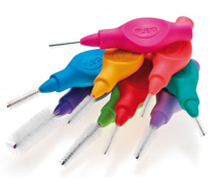Mum’s the word
Featured Products Promotional FeaturesPosted by: Dental Design 11th April 2024

With the right advice and by taking proactive steps, pregnant women can maintain good oral health.
Scientists have recently discovered why many women experience morning sickness during pregnancy,[i] raising the prospects of a cure for the condition. The cause is down to a hormone produced by the foetus, a protein known as GDF15. How sick the mother feels depends on a combination of how much of the hormone is produced by the foetus and how much exposure the mother had to this hormone before becoming pregnant. Exposing women to GDF15 ahead of pregnancy may prove a way to prevent morning sickness in the future, researchers believe.
The frequent vomiting and acid reflux associated with morning sickness is a debilitating condition. It can also have a detrimental effect on tooth enamel.[ii] Indeed, while pregnancy can be an amazing and transformative time in a woman’s life, many pregnant women are unaware of the specific oral health issues that can arise during pregnancy and how to properly care for their teeth and gingiva.
With morning sickness, the stomach acids can erode the protective enamel layer of the teeth, making them more susceptible to decay and sensitivity. To minimise this risk, pregnant patients should be advised to rinse their mouths with water or a fluoridated mouthwash after vomiting and wait at least half an hour before brushing to allow the saliva to neutralise the acid.[iii]
Hormonal surges
Hormonal changes are one of the primary factors that contribute to oral health challenges during pregnancy. The surge in hormonal levels, specifically oestrogen and progesterone, can lead to an increased blood flow to the gingiva. This increased blood flow, coupled with the presence of more bacteria in the mouth due to changes in eating habits and oral care routines, can result in swollen, tender and bleeding gums. This condition, known as pregnancy gingivitis,[iv] affects up to 75% of pregnant women.[v]
Additionally, pregnancy hormones can affect the body’s response to plaque.ii Plaque build-up can occur more easily and may result in an inflammatory response from the gingiva, leading to more severe gingival diseases such as periodontitis,[vi] or a pregnancy epulis. If left untreated, periodontitis can lead to tooth loss and other serious oral health complications,[vii] and an epulis can require surgical excision to remove.
Pregnancy cravings are a common phenomenon, and many women find themselves indulging in sugary treats more often than usual. However, increased sugar consumption can significantly contribute to tooth decay and cavities.[viii] It is essential for pregnant patients to be mindful of their sugar intake and opt for healthier snack alternatives like fruits and vegetables.
Regular check-ups
Another crucial aspect of oral care during pregnancy is regular dental check-ups. Expectant mothers in the UK are entitled to free NHS dental treatment and for 12 months after the baby is born.[ix] Dental professionals can identify any potential issues early on and provide appropriate treatment to prevent further complications. Some dental treatments, such as fillings and endodontic procedures, are safe to undergo during pregnancy,[x]especially during the second trimester.[xi]
 Maintaining good oral hygiene is vital during pregnancy. Pregnant patients should aim to brush their teeth at least twice a day with a soft bristled toothbrush and fluoride toothpaste.ii Using an antimicrobial mouthwash can also help reduce plaque and bacteria in the mouth.[xii] It is important to focus on proper brushing techniques, paying attention to the gumline and hard-to-reach areas.
Maintaining good oral hygiene is vital during pregnancy. Pregnant patients should aim to brush their teeth at least twice a day with a soft bristled toothbrush and fluoride toothpaste.ii Using an antimicrobial mouthwash can also help reduce plaque and bacteria in the mouth.[xii] It is important to focus on proper brushing techniques, paying attention to the gumline and hard-to-reach areas.
Interdental cleaning should not be neglected. Regular interproximal cleaning can help prevent gingival disease[xiii] and maintain healthy gingiva throughout pregnancy. The FLEXI range of interdental brushes from TANDEX can help remove more plaque than brushing alone. Each product’s handle is flexible, and the brush can be bent into the perfect shape to clean in between the teeth. Available in 11 different sizes, the range presents a solution for each individual patient, for a comfortable and effective clean. They can be used to easily apply PREVENT GEL too, a product which contains 0.12% chlorhexidine and 900ppm fluoride known for their antibacterial and enamel strengthening properties.
Oral care challenges during pregnancy are common, but with the right knowledge and by taking proactive steps, pregnant women can maintain good oral health. Practising proper oral hygiene habits, visiting the dentist regularly, and being mindful of diet and cravings are essential for a healthy smile during pregnancy. By prioritising oral care, pregnant women can ensure not only their own well-being but also the health of their developing baby.
For more information on Tandex’s range of products,
visit https://tandex.dk/
Our products are also available from CTS Dental Supplies https://www.cts-dental.com/ and DHB Oral Healthcare https://dhb.co.uk/
Author Kimberley Lloyd- Rees on behalf of Tandex
Kimberley graduated from the University of Sheffield in 2010, where she now works as a clinical tutor in Dental Hygiene and Therapy as well as working in practice. She has spent her career working across a variety of specialist private and mixed dental practices, for the MOD and volunteering her time to a dental charity in Nepal.
[i] Fejzo, M., Rocha, N., Cimino, I. et al. GDF15 linked to maternal risk of nausea and vomiting during pregnancy. Nature (2023).https://doi.org/10.1038/s41586-023-06921-9 [Accessed January 2024]
[ii] Yenen Z, Ataçağ T. Oral care in pregnancy. J Turk Ger Gynecol Assoc. 2019 Nov 28;20(4):264-268. doi: 10.4274/jtgga.galenos.2018.2018.0139. Epub 2018 Dec 17. PMID: 30556662; PMCID: PMC6883753. [Accessed January 2024]
[iii] NHS https://www.nhs.uk/pregnancy/related-conditions/common-symptoms/bleeding-gums/
[iv] Wu M, Chen SW, Jiang SY. Relationship between gingival inflammation and pregnancy. Mediators Inflamm. 2015;2015:623427. doi: 10.1155/2015/623427. Epub 2015 Mar 22. PMID: 25873767; PMCID: PMC4385665. [Accessed January 2024]
[v] Centers for Disease Control and Prevention https://www.cdc.gov/oralhealth/publications/features/pregnancy-and-oral-health.html
[vi] Srinivas SK, Parry S. Periodontal disease and pregnancy outcomes: time to move on? J Womens Health (Larchmt). 2012 Feb;21(2):121-5. doi: 10.1089/jwh.2011.3023. Epub 2011 Oct 12. PMID: 21992584; PMCID: PMC3270055. [Accessed January 2024]
[vii] Nazir MA. Prevalence of periodontal disease, its association with systemic diseases and prevention. Int J Health Sci (Qassim). 2017 Apr-Jun;11(2):72-80. PMID: 28539867; PMCID: PMC5426403. [Accessed January 2024]
[viii] Moynihan P. Sugars and Dental Caries: Evidence for Setting a Recommended Threshold for Intake. Adv Nutr. 2016 Jan 15;7(1):149-56. doi: 10.3945/an.115.009365. PMID: 26773022; PMCID: PMC4717883. [Accessed January 2024]
[ix] NHS England https://www.nhs.uk/pregnancy/finding-out/health-things-you-should-know-in-pregnancy
[x] Ibhawoh L, Enabulele J. Endodontic treatment of the pregnant patient: Knowledge, attitude and practices of dental residents. Niger Med J. 2015 Sep-Oct;56(5):311-6. doi: 10.4103/0300-1652.170386. PMID: 26778880; PMCID: PMC4698844. [Accessed January 2024]
[xi] British Society of Periodontology https://www.bsperio.org.uk/assets/downloads/Guidelines_for_oral_health_professionals.pdf
[xii] Haerian-Ardakani A, Rezaei M, Talebi-Ardakani M, Keshavarz Valian N, Amid R, Meimandi M, Esmailnejad A, Ariankia A. Comparison of Antimicrobial Effects of Three Different Mouthwashes. Iran J Public Health. 2015 Jul;44(7):997-1003. PMID: 26576378; PMCID: PMC4645771. [Accessed January 2024]
[xiii] Ng E, Lim LP. An Overview of Different Interdental Cleaning Aids and Their Effectiveness. Dent J (Basel). 2019 Jun 1;7(2):56. doi: 10.3390/dj7020056. PMID: 31159354; PMCID: PMC6630384. [Accessed January 2024]
No Comments
No comments yet.
Sorry, the comment form is closed at this time.





